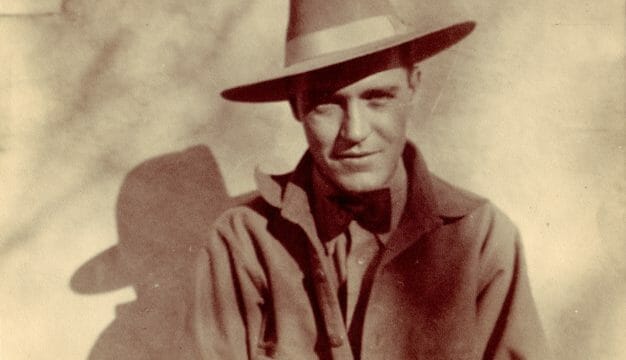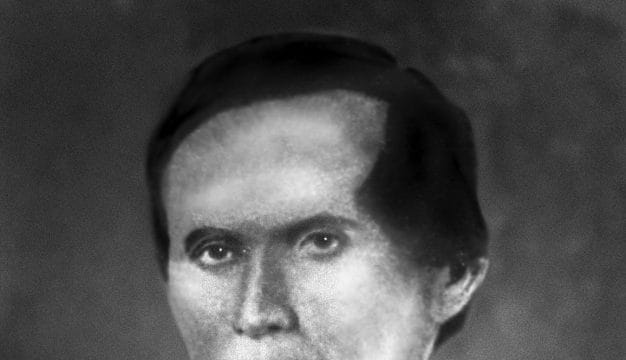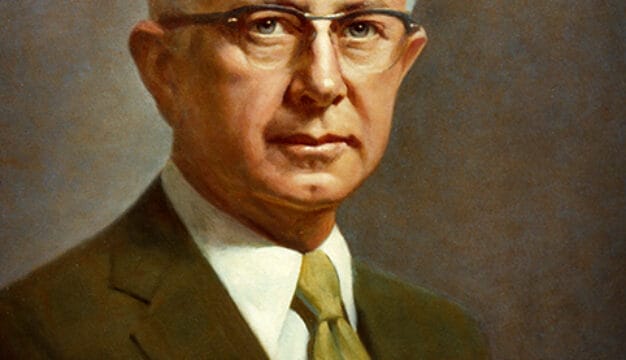Edmundite Southern Missions
 Frank Casey
The Edmundite Southern Missions is a Catholic organization founded in Selma, Dallas County, in 1937 to work among African Americans. Though its initial goal was to convert blacks to Catholicism, its chief impact has been as a social service organization. Controversial locally because of its support of the black voting rights campaign, it attracted national attention when the Edmundite-run hospital treated the victims of the “Bloody Sunday” police violence at the Edmund Pettus Bridge during the Selma to Mongomery march. The organization was founded by the Society of Saint Edmund, a group of Catholic priests and brothers. The Edmundites, founded in France in 1843, came to the United States in 1898 and have been based in Vermont since 1930. In 1936, Pope Pius XI called on American religious orders to reach out to African Americans, whom the Pope felt had been neglected by both church and state. The Edmundites responded by selecting two young priests, Father Frank Casey and Father John “Barney” Paro, to take on the assignment. They wrote to Bishop Thomas J. Toolen of Mobile, who invited them to set up a “colored mission” in Selma, Alabama.
Frank Casey
The Edmundite Southern Missions is a Catholic organization founded in Selma, Dallas County, in 1937 to work among African Americans. Though its initial goal was to convert blacks to Catholicism, its chief impact has been as a social service organization. Controversial locally because of its support of the black voting rights campaign, it attracted national attention when the Edmundite-run hospital treated the victims of the “Bloody Sunday” police violence at the Edmund Pettus Bridge during the Selma to Mongomery march. The organization was founded by the Society of Saint Edmund, a group of Catholic priests and brothers. The Edmundites, founded in France in 1843, came to the United States in 1898 and have been based in Vermont since 1930. In 1936, Pope Pius XI called on American religious orders to reach out to African Americans, whom the Pope felt had been neglected by both church and state. The Edmundites responded by selecting two young priests, Father Frank Casey and Father John “Barney” Paro, to take on the assignment. They wrote to Bishop Thomas J. Toolen of Mobile, who invited them to set up a “colored mission” in Selma, Alabama.
Casey and Paro arrived in Selma on July 6, 1937, and moved into a former saloon on Broad Street. They began by conducting door-to-door evangelization of the black community and building a small chapel, St. Elizabeth’s Mission. They were resented as “sheep stealers” by some black clergy and suspected of being “Catholic Communists” by some white conservatives. But their services to the poor gradually won them respect from the community at large.
Soon the missionary band were extending their efforts to other parts of the state. In 1938, Paro founded All Saints Mission in Anniston. Between 1939 and 1942, the Edmundites accepted invitations from Toolen to serve six missions and parishes along Mobile Bay (some white, some black, and some mixed) from Mobile down to Dauphin Island. In 1945 they set up St. Martin de Porres Mission in Gadsden, Alabama.
In 1940 the Missions welcomed the Sisters of Saint Joseph (S.S.J.) from Rochester, New York, who came to Selma to provide education and social ministry. Other orders of nuns were to join in the work of the Missions, including the Discalced Carmelites (O.C.D.), who came to Mobile in 1943 to pray for the success of the Missions; the Daughters of the Holy Spirit, who came in 1954 to found mission schools in Anniston and Gadsden; and the Carondelet Sisters of St. Joseph (C.S.J.), who came in the 1970s to help set up rural health clinics in west-central Alabama. Nuns from several other orders have worked for the Missions.
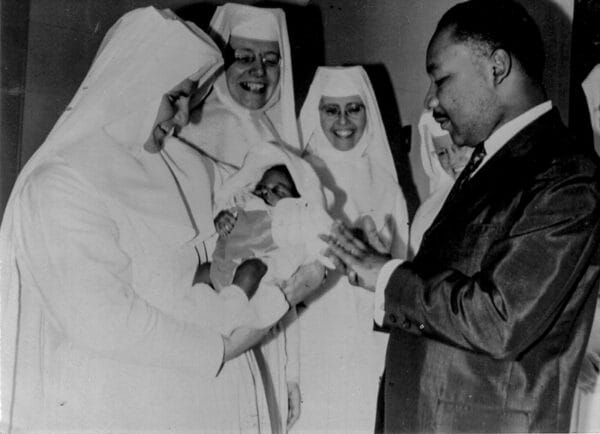 Martin Luther King Jr. and Sisters of St. Joseph
The Missions’ greatest impact has been in Selma. The Sisters of St. Joseph started St. Elizabeth’s School in 1941 and Holy Infant Inn (a nursing home) in 1943. In 1944, the Edmundites purchased Selma Good Samaritan, a rundown infirmary for blacks, and the Sisters set about transforming it into a modern facility. In 1950, they established the Good Samaritan School of Nursing. Father Nelson Ziter launched the Don Bosco Boys’ and Girls’ Club (1947-1966), named after the patron saint of youth work. The club helped some 150 black youth make the contacts and win the financial assistance needed to attend college. One participant, Moses Anderson, became an Edmundite priest and later served as the first black Catholic pastor both in North Carolina (1961) and in Alabama (1981) before being called to Detroit as auxiliary bishop in 1983.
Martin Luther King Jr. and Sisters of St. Joseph
The Missions’ greatest impact has been in Selma. The Sisters of St. Joseph started St. Elizabeth’s School in 1941 and Holy Infant Inn (a nursing home) in 1943. In 1944, the Edmundites purchased Selma Good Samaritan, a rundown infirmary for blacks, and the Sisters set about transforming it into a modern facility. In 1950, they established the Good Samaritan School of Nursing. Father Nelson Ziter launched the Don Bosco Boys’ and Girls’ Club (1947-1966), named after the patron saint of youth work. The club helped some 150 black youth make the contacts and win the financial assistance needed to attend college. One participant, Moses Anderson, became an Edmundite priest and later served as the first black Catholic pastor both in North Carolina (1961) and in Alabama (1981) before being called to Detroit as auxiliary bishop in 1983.
The Edmundites found themselves the center of controversy during the 1960s, when they were the only whites in Selma who openly supported the voting rights movement. Good Samaritan Hospital won national attention for treating the people beaten at the Edmund Pettus Bridge on “Bloody Sunday,” March 7, 1965. Toolen (now an archbishop) expelled Father Maurice Ouellet, the pastor of St. Elizabeth’s, from Alabama because of his involvement in the protests, reportedly to protect the priest’s life. The Edmundites became very unpopular in white Selma for some time.
After the Voting Rights Bill was passed, the Missions continued to promote reconciliation and racial progress. Ultimately, Father James Robinson, S.S.E., assistant director of the Missions and another former member of the Don Bosco Boys’ Club, succeeded in bringing black and white leaders together to draw up the Selma Accords of 1972. Black leaders agreed to withdraw their lawsuits, which had been blocking Selma from receiving federal money for housing and internal improvements, in exchange for a greater role in administering the programs. The Accords made possible the city’s acquiring some $3 million in federal funds to build houses, pave streets, and build sewers.
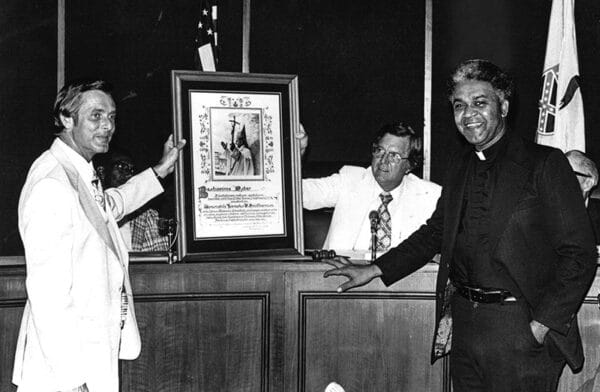 James Robinson and Joe Smitherman
Integration had a dramatic effect on the work of the Missions. In 1970, St. Elizabeth’s Mission merged with the older white parish, Assumption, to form Our Lady, Queen of Peace. (The black missions in Anniston and Gadsden followed a similar course.) That same year, the S.S.J.s closed their school of nursing because the state had set up an integrated school of nursing in Selma. When Good Samaritan Hospital finally closed its doors in 1983, Selma mayor Joe T. Smitherman suggested “Killed by Integration” as its epitaph.
James Robinson and Joe Smitherman
Integration had a dramatic effect on the work of the Missions. In 1970, St. Elizabeth’s Mission merged with the older white parish, Assumption, to form Our Lady, Queen of Peace. (The black missions in Anniston and Gadsden followed a similar course.) That same year, the S.S.J.s closed their school of nursing because the state had set up an integrated school of nursing in Selma. When Good Samaritan Hospital finally closed its doors in 1983, Selma mayor Joe T. Smitherman suggested “Killed by Integration” as its epitaph.
The Missions increasingly focused on new ways of serving the poor of all backgrounds. The Edmundites opened a Catholic Social Ministries office in Selma in 1977. They helped launch rural health clinics in Uniontown (1978), Pine Apple (1979), Alberta (1982) and Vredenburgh (1985). They also set up learning centers in Lowndes County (1982), Selma (1983), Pine Apple (1983), and Vredenburgh (1988). Perhaps their best known service to the poor is the Bosco Nutrition Center in Selma, which has fed the hungry a free hot meal every day of the year since 1986. Food pantries have also been established in Lowndes and Wilcox counties.
In Alabama today, the Edmundites staff only one parish, Queen of Peace in Selma. But their commitment to Father Frank Casey’s goal of helping the poor remains the same.
Further Reading
- Chestnut, J. L., Jr., and Julia Cass. Black in Selma. New York: Farrar, Strauss & Giroux, 1990.
- Fitts, Alston. Selma, Queen City of the Black Belt. Selma, Ala.: Clairmont Press, 1989.
- Hart, Jayasri Majundar. Sisters of Selma: Bearing Witness for Change. Birmingham, Ala.: Hartfilms and Alabama Public Television, 2003.
- McLaughlin, Joseph M. From Pontigny: A Chronology of the Society of Saint Edmund. Colchester, Vt.: Society of Saint Edmund, 1978.
- Thornton, J. Mills, III. Dividing Lines, Municipal Politics and the Struggle for Civil Rights in Montgomery, Birmingham and Selma. Tuscaloosa, Ala.: University of Alabama Press, 2002.
